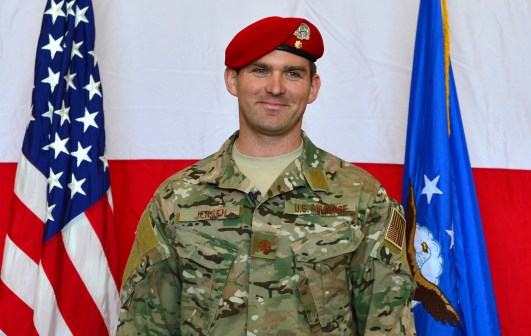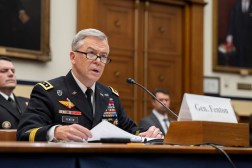Senior Pentagon official calls on DOD components to more fully embrace irregular, asymmetric warfare

Special operations forces have long held the primary responsibility for irregular warfare within the U.S. military, but other Department of Defense components should now take on a larger role, according to a senior official.
“I actually push back on the notion that that [U.S. Special Operations Command] should be the lead for irregular warfare. I think we need the rest of the department to embrace it as well,” Chris Maier, assistant secretary of defense for special operations and low-intensity conflict, said at the NDAI SO/LIC Symposium Tuesday.
Maier said that at the most basic level, irregular warfare takes place below the threshold of large-scale armed conflict, or what experts refer to as “the gray zone.” Gray-zone activity has significantly increased in recent years as adversaries have sought to undermine the U.S. and its allies without triggering a robust military response.
What makes irregular warfare so difficult, Maier asserted, is the DOD is focused primarily on major military operations.
“In some of the biorhythms of the department, there’s not a lot of focus on individuals or small units doing asymmetric things — it’s on big formations doing big things,” he said.
“I kind of use the model of counterterrorism a little bit here, where, when we were really focused on counterterrorism as a department, as a nation, yes, SOF was the lead, but SOF wasn’t the only ones doing it. The services were providing tremendous support in the form of enablers, but also operational impacts,” he continued. “I think we need to get to a place where SOCOM may be the intellectual lead [for irregular warfare], may in some cases even be the operational lead, but we’re going to need the rest of the department to embrace this, fund this, enable this. They’re going to have to do a lot of this themselves.”
Top officials at last year’s conference questioned whether there need to be changes to how the DOD conducts irregular warfare and information operations now that the department’s main focus is on great power competition.
Maier believes the DOD is has a lot more work to do when it comes to addressing irregular warfare and asymmetric issues like the gray zone.
“There’s many synonyms for it, which should tell you we don’t even really know in some cases precisely what we’re talking about,” he said.
Moreover, when it comes to information operations, the U.S. has lagged behind others, primarily due to the different risk calculations from senior policy makers on how to use information, according to Maier.
Terrorist organizations don’t use the information space like nation-state actors such as China, Russia and Iran do, Maier said. As a result, there has been varying risk calculations at senior policy levels as to how much the U.S. military should go tit for tat in the information environment.
“How much should the Department of Defense as a core military organization be doing that influence? Some of what we’ve attempted to tighten up over the last couple of years is ensuring that we’re using our information tools towards military objectives. This has given us frankly, a little bit more space then to be able to do things more innovatively from our senior policy makers,” he said.
What sets the Pentagon apart from many of its partners and allies is that the majority of information billets reside within special operations units, making it harder to fill them. This has become especially true given recruitment issues throughout the services, particularly the Army, which had to make cuts to its special operations forces.
“When we talk about Army SOF cuts, it’s not going to be probably news here, but we took some of the unfilled billets off the table, because that made sense to do, not take human beings out and some of those came out of our psyops enterprise because we haven’t been able to fill some of these billets for years,” Maier said, acknowledging these cuts. “If we’re not using these forces in a way that really contributes to our future and our SOF value proposition, we’re probably not going to fill those as much. Then we’re in this situation where we’re not filling them as much, so we’re not able to then project that power in unique and exquisite ways that we need to that. At the end of the day, you’re going to have to be informed by that risk environment we’re in.”






